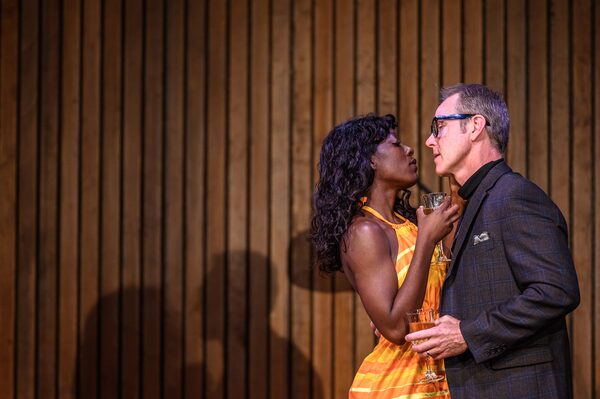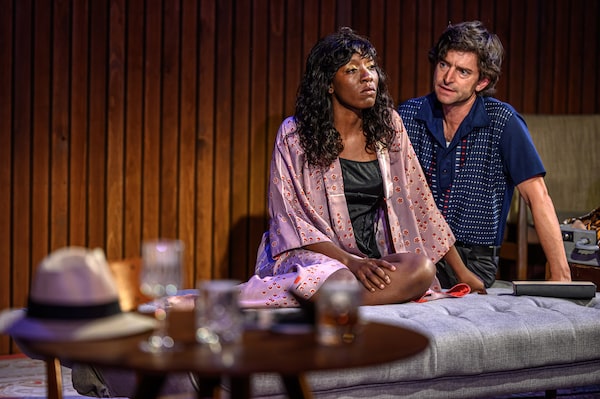
Virgilia Griffith, left, and Ryan Hollyman in Betrayal.Dahlia Katz/Handout
Title: Betrayal
Written by: Harold Pinter
Genre: Drama
Director: Andrea Donaldson
Actors: Virgilia Griffith, Ryan Hollyman and Jordan Pettle
Company: Soulpepper Theatre
Venue: Young Centre for the Performing Arts
Year: Runs to Sept. 22
Last winter, Soulpepper Theatre gave us some minor Harold Pinter with Little Menace, a selection of his short plays, which in my estimation was cleverly staged but unsatisfying. Now, happily, we get major Pinter, conventionally staged but more rewarding, with the company’s production of his 1978 drama Betrayal.
The Nobel-winning playwright’s most enduringly popular work – it inspired a Seinfeld parody in the 1990s and it’s currently on Broadway again in a British revival starring Tom Hiddleston – Betrayal coolly dissects a seven-year extramarital affair by cunningly working backward. It opens after the affair has ended and then proceeds to track it, over seven scenes, from the final breakup to the first kiss.
Ex-lovers Emma (Virgilia Griffith), a gallery owner, and Jerry (Ryan Hollyman), a literary agent, are meeting in 1977, two years after they called it quits. Over drinks in a pub, Emma reveals that her husband Robert has just confessed to being unfaithful to her. But then, Emma was unfaithful to Robert for seven years with Jerry. And Jerry, who betrayed his own wife, also betrayed his relationship with Robert, his colleague and oldest friend.
Later, Jerry meets with Robert (Jordan Pettle) and is shocked to discover that Robert has known about his affair with Emma for years.

The play coolly dissects a seven-year extramarital affair by cunningly working backward.Dahlia Katz
At that point, the play begins to rewind. Two years earlier, we see Jerry and Emma making a brusque last visit to their secret love nest, a flat in London’s Kilburn district, and deciding what to do with the furnishings. A few scenes later, we see them during one of their first trysts at the flat, making passionate love. And so we are borne back, Gatsby-like, ceaselessly into the past.
Watching a love revert from its withered, bitter dissolution to its vibrant full bloom has a melancholic fascination and Griffith’s Emma embodies it palpably here – helped along by Ken MacKenzie’s apt costumes. Cold, irritable, attired for business during the breakup with Jerry, later we see her bounce into the flat in a bright orange sundress, radiantly eager to see him. And sure enough, when the affair begins in 1968, she’s rocking a sexy afro and platform shoes.
The play’s two central scenes involving Robert are, however, the most powerful ones. In the first, he learns of the affair while he and Emma are on holiday in Venice. After that, back in London, he has a lunch with Jerry in which his hidden knowledge of his friend’s betrayal manifests itself in drunken, aggressive behaviour. Pettle’s tensely smiling Robert masks his inner anguish with brittle bonhomie and flippant self-criticism. The lunch scene is Pinter at his best, as is Robert’s earlier quiet confrontation with Emma, when director Andrea Donaldson treats us to one of those classic blood-chilling Pinter pauses.

Ken MacKenzie provides a solidly realistic decor of wood-panelled walls, Persian carpets and seventies-era furniture, which clashes with director Andrea Donaldson’s attempts at a more fluid and imaginative staging.Dahlia Katz
If this is first-rate Pinter, however, it’s not quite a first-rate production. MacKenzie, who also designed the set, provides a solidly realistic decor of wood-panelled walls, Persian carpets and seventies-era furniture, which clashes with Donaldson’s attempts at a more fluid and imaginative staging. The backward march of time is signalled by a heavy-handed Richard Feren score. (His preshow mood-setter, however, a soundtrack of 1977 rock classics, is a lot of fun.) Finally, the show is handicapped by Hollyman’s Jerry, whose mannered, comical performance feels like it belongs in an Alan Ayckbourn play, not a Pinter one.
But if you can look past those faults, there’s the pleasure of Pinter’s precisely crafted dialogue, where behind every seemingly oblique or irrelevant comment lurks a shadow of meaning. It’s a play in which a few recurring images – a child tossed in the air at a party, a solitary trip to the island of Torcello – gain meaning with each repetition. And then there’s his artful exploration of the play’s eponymous theme.
At one point, Robert, a publisher, criticizes a new novel, apparently also about betrayal, declaring that there’s nothing new to say on the subject. It’s one of Pinter’s sly jokes. In Betrayal, an intricate dance of deception where even love is betrayed by time, he shows us that on the contrary, there’s plenty still to be said.
Betrayal continues to Sept. 22. (soulpepper.ca)
Live your best. We have a daily Life & Arts newsletter, providing you with our latest stories on health, travel, food and culture. Sign up today.